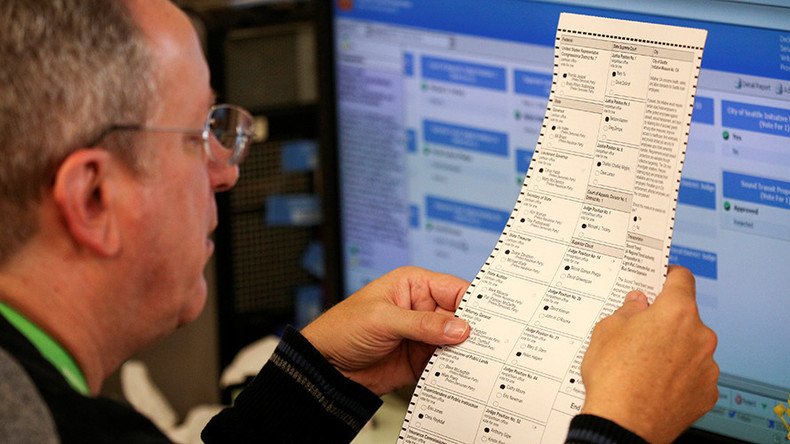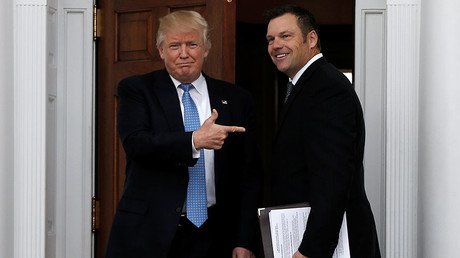Privacy group sue Trump’s voter fraud commission, argues data request violates federal law

A privacy watchdog has filed suit to prevent President Donald Trump’s voter fraud commission from collecting voter information. It argues there are no established safeguards to ensure that personal data is protected.
The Washington, DC-based Electronic Privacy Information Center (EPIC) requested a Temporary Restraining Order (TRO) Monday to block the Presidential Advisory Commission on Election Integrity from gathering voter data until the impact on privacy can be assessed.
EPIC Files Response to Election Commission in #Voter#Privacy Case. #voterprivacy#PACEIhttps://t.co/vP56ijNTYF
— EPIC (@EPICprivacy) July 6, 2017
EPIC argues that the commission violated federal law when it made the request for all 50 states and the District of Columbia to transmit voter records to a non-secure website without authentication.
The group says the commission should have conducted a Privacy Impact Assessment (PIA) to identify and mitigate privacy risks before making the request.
Trump’s commission does not have “any procedures in place to protect voter privacy or the security and integrity of the state voter data,” and there is already evidence that the commission “has placed and will place voter data at risk,” EPIC said.
“The integrity of state voting systems is of paramount importance and should not be put at risk at the whim of the Commission members,” the lawsuit reads.
“Once data has been leaked, there is no way to control its spread. With a data breach, there is literally no way to repair the damage, once done.”
A federal district court in DC scheduled a hearing Friday to consider the case against the commission.
Trump established the commission with an executive order in May to “study the registration and voting processes used in Federal elections” and “enhance the American people’s confidence in the integrity of the voting processes used in Federal elections”
The Justice Department argued that EPIC “seeks to halt this important work with meritless claims and a baseless fear about the states voluntarily submitting publicly available voter data to the federal government.”
“The voter data that EPIC seeks to enjoin the Commission from collecting is already made publicly available by the states,” The Justice Department said in a filing Wednesday. “The Commission has established reasonable measures to protect the security of the voter data by using a secure method to transfer the data and storing any data in the White House’s information systems.”
#TheBigPicture: The New Voter Suppression Has Begun [VIDEO] https://t.co/SWtB9hs3to@Thom_Hartmann@Greg_Palast
— RT America (@RT_America) July 7, 2017
Last month, Kris Kobach, the Secretary of State for Kansas and vice-chair of the Commission, sent a letter to all 50 states, requesting publicly available voter data as permitted under their state laws.
The information requested by the commission includes: “the full first and last names of all registrants, middle names or initials if available, addresses, dates of birth, political party (if recorded in your state), last four digits of social security number if available, voter history (elections voted in) from 2006 onward, active/inactive status, cancelled status, information regarding any felony convictions, information regarding voter registration in another state, information regarding military status, and overseas citizen information.”
Several states refused to send their voter information to the commission, arguing that it could threaten the privacy of their voters.
In his letter, Kobach said “any documents that are submitted to the full Commission will also be made available to the public.” However, in a declaration filed with the court Wednesday, Kobach said the commission will not release any voter roll data to the public. He added that, as of Wednesday, no Secretary of State had sent any information to the commission.
In response to the filings from Kobach and the Justice Department, EPIC filed a reply Thursday, arguing that the commission “ties itself in knots” when it says the information it is seeking is already available to the public, while, at the same time, assuring the courts that the information will be protected.
“The Commission has conceded the obvious: the privacy implications of this unprecedented demand for voter roll data from across the country are staggering,” EPIC’s filing reads.
Additionally, the watchdog argues that the commission has “no legal authority to collect the personal voter data it has requested” without ensuring that privacy safeguards are in place.
“There is nothing in the Executive Order or the Commission’s Charter that provides authority to gather hundreds of millions of voter records from the states or to create a secret database stored in the White House,” the filing reads.












